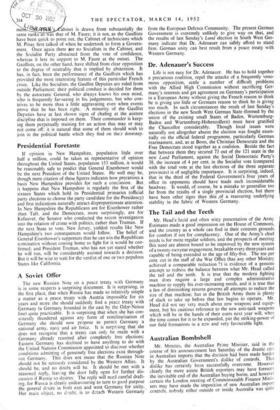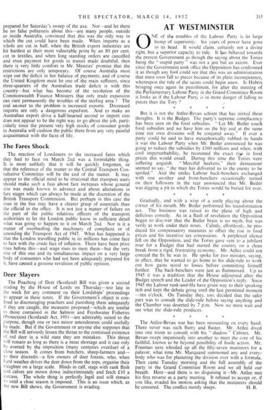Australian Bombshell
Mr. Menzies, the Australian Prime Minister, said in the course of his announcement last Saturday of the drastic cuts in Australian imports that the decision had been made harder by the Australian Government's dislike of controls. That dislike has certainly been successfully overcome. However clearly the more astute British exporters may have foreseen the inevitable end of the Australian buying boom, and however certain the London meeting of Commonwealth Finance Minis- ters may have made the imposition of new Australian import controls, nobody either outside or inside Australia was quite prepared for Saturday's sweep of the axe. Nor—and let there be no false politeness about this—are many people, outside or inside Australia, convinced that this was the only way in which the cut could have been made. When imports as a whole are cut in half, when the British export industries are hit hardest at their most vulnerable point by an 80 per cent. cut in textiles, and when long standing orders are cancelled and even payment for goods in transit made doubtful, then there is very little comfort in Mr. Menzies' promise that the restrictions are only temporary. Of course Australia must wipe out the deficit in her balance of payments, and of course the United Kingdom must be one of the main sufferers, since three-quarters of the Australian trade deficit is with this country—but what has become of the resolution of the Commonwealth Finance Ministers that only trade expansion can cure permanently the troubles of the sterling area ? The real answer to the problem• is increased exports. Decreased imports are only a dangerous expedient. And to make an Australian export drive a half-hearted second to import cuts does not appear to be the right way to go about the job, parti- cularly since the present very high stocks of consumer goods in Australia will cushion the public there from any very painful acquaintance with the facts of life.











































 Previous page
Previous page